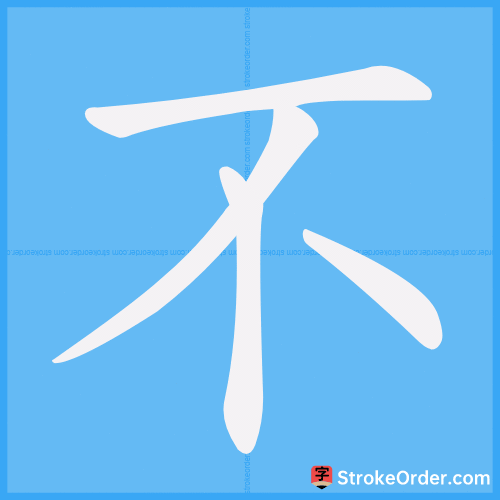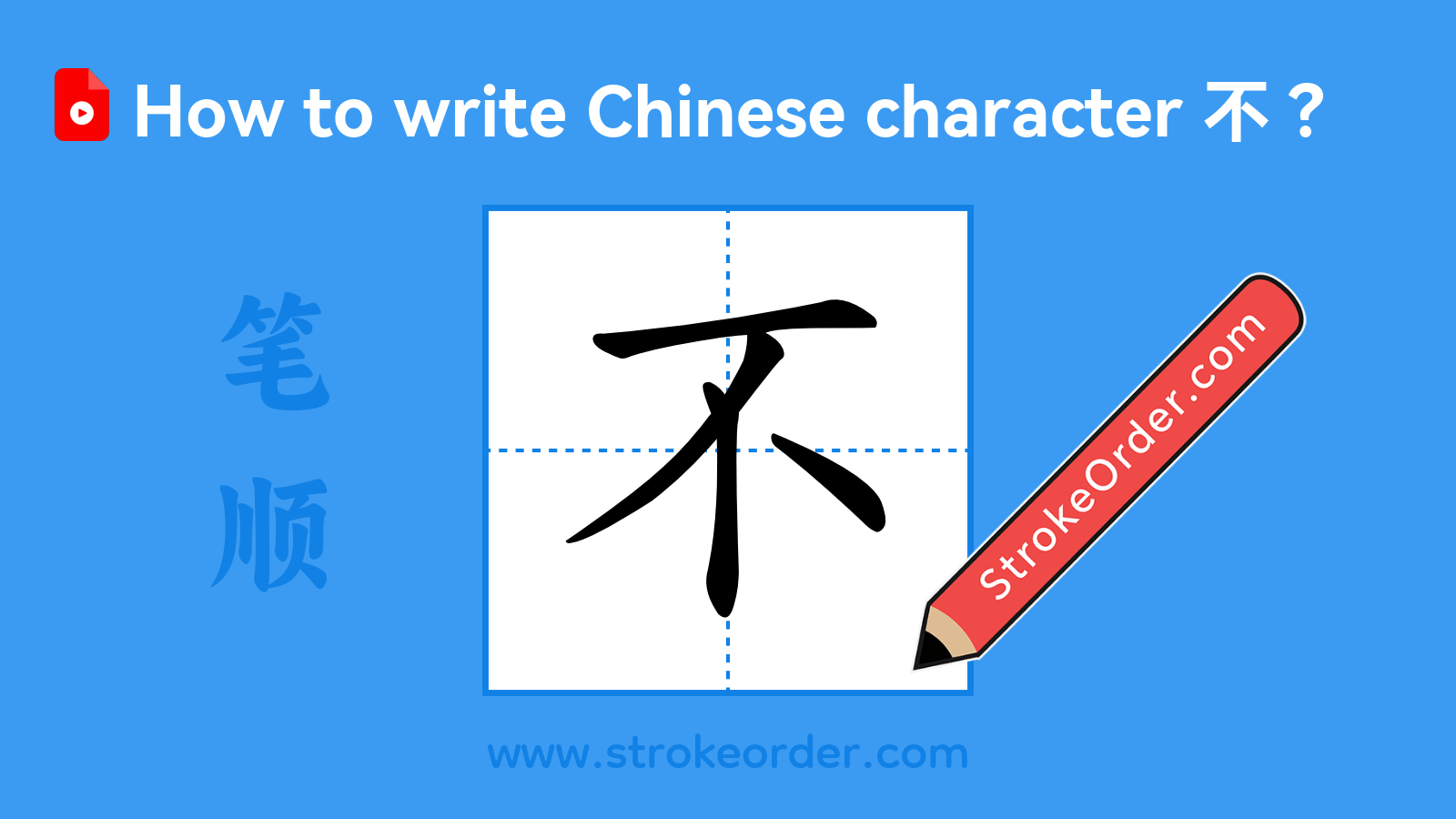不 Stroke Order
Animated Stroke Order of 不

Stroke Order Diagrams for 不

Step-by-Step Handwriting Guide for 不

Learn to Write Chinese Characters with Video Tutorials
Watch the video of writing the Chinese character "不", learn the correct stroke order (笔顺) of the character "不", and master the standard way of writing the character "不".

Free Printable Handwriting Practice with Stroke Order: 不
Printable Writing Practice Worksheet of "不" in Portrait Orientation (Tian Zi Ge)

Printable Writing Practice Worksheet of "不" in Landscape Orientation (Tian Zi Ge)

Information of 不
Pinyinbù、 fǒu、 fōu、 pī、 pǐ、 fū
Radical
一
Strokes
4 strokes
Usage
★★★★★
Definition
(negative prefix) / not / no
不 [bù] 1. Adverb. 2. Used before verbs, adjectives, and other words to indicate negation or placed before nouns or nominalized morphemes to form adjectives: 不去 (not go), 不多 (not many), 不法 (not lawful), 不料 (unexpected), 不材 (mediocre; often used as a self-deprecating term), 不刊 (without need for modification, indelible), 不学无术 (uneducated and unskilled), 不速之客 (uninvited guest). 3. Used alone as a negative response: 不,我不知道 (No, I don't know). 4. Used at the end of a sentence to indicate a question: 他现在身体好不? (Is he in good health now?) 不 [bù] 1. Adverb. 2. Used before verbs, adjectives, and other words to indicate negation: (not, no). 3. Neither this nor that: (neither…nor). 4. Occurs without the prerequisite conditions for the subsequent actions and states: (without). 5. As a function word, indicating a lack or neglect of a certain action: (without). 6. Used between repeated identical words, often preceded by "什么," indicating indifference or irrelevance: (no matter (what)). 7. Indicates that something is not necessary in terms of logic or feelings: (no need to). 8. Used after a verb to indicate that an expected result or purpose cannot be achieved: (cannot do as expected). 9. Used alone to negate the other person's words or questions: (no). 10. Used at the end of a sentence to form a question: (whether). 不 [bù] 1. Auxiliary. 2. Used to strengthen tone. 3. Used to adjust syllable. 不 [bù] 1. Also means "big" or "great" (通“丕” pī). 2. Note: The character 不 is pronounced as the second tone (阳平) before the fourth tone character (去声), e.g., 不必 (bú bì), 不是 (bú shì). 不 [bù] Indicates question, uncertainty or indefiniteness, same as "否". Auxiliary word indicating negation. Same as "否". Example: 《史记》: "上问曰:道军所来,闻鼂错死,吴楚罢不?" (The emperor asked: With the news of Zhao Cao's death, have Wu and Chu ceased fighting?) Auxiliary word indicating a question or uncertainty, same as "否". Example: 晋·陶渊明: "未知从今去,当复如此不?" (Not sure if going forward will still be the same?) Noun: A surname, such as 不准 from the Jin dynasty. Noun: A surname, such as 不准 from the Jin dynasty. Noun: The peduncle of a flower. Example: 《诗经》: "常棣之华,鄂不韡韡。" (The flowers of the wild plum tree, the peduncle is not withering.) Noun: The peduncle of a flower. Example: 《诗经》: "常棣之华,鄂不韡韡。" (The flowers of the wild plum tree, the peduncle is not withering.)
to not say a word
as easy as blowing off dust / effortless / with ease
to forget and not bear recriminations (idiom); to let bygones be bygones / There is no point in crying over spilt milk.
not censure sb for his past misdeeds / overlook sb's past mistakes / let bygones be bygones
Neither salty nor light
Can't swallow
that's just the way it is / exactly!
see 可不是[ke3 bu5 shi4]
just as / no less than / like (sth momentous) / as good as / tantamount to
to be full of praise (idiom)
not eat / eat nothing / without eating
to chatter or jabber on and on
other than / be differ from / be different than
not to stint / to be generous (with praise etc) / to be prepared to (pay a fee, give of one's time etc)
you are so kind to give me a reply / please favour me you instruction / please don't hesitate to let me know if there is any mistake
decline to comment / not express an opinion / be noncommittal / hedge
to fall short of / not as good as / too late
there's not enough time (to do sth) / it's too late (to do sth)
impatient (idiom); in a hurry / itching to get on with it
constant / unvarying / (math.) invariant
constant capital
only / merely / nothing but / no more than / it's just that ...
lit. not to know whether to laugh or cry (idiom) / both funny and extremely embarrassing / between laughter and tears
lit. a donkey's lips do not match a horse's mouth (idiom) / fig. beside the point / incongruous
bad / ill / not good at / not to be pooh-poohed / quite impressive
it goes without saying / it is self-evident
to be impervious to reason (idiom) / unreasonable
inexpressible (idiom)
cannot bear / cannot stand / utterly / extremely
unable to conceal one's happiness, amazement, shock etc / grinning from ear to ear / mouth agape / gobsmacked
Input Method for 不
Pinyinbu4
Wubi
gii|dhi
Cangjie
mf
Zhengma
gi
Four Corner
10900
Unicode
U+4e0d
Same Pronunciation Characters
哺埠布怖步簿补部不卟晡瓿逋钚佈埗歨補醭鈽钸峬庯誧轐鳪鵏鸔吥歩咘捗勏鈈蔀廍踄餔郶篰餢獛㚴㨐㙛㘵㻉䏽䀯㾟䍌䑰䒈䋠䝵䬏䪁䪔䴝䴺䳝
Same Radical Characters
无一丁七万丈三上下不与丐丑专且世丙业丛东丝两严丽丏丕丞兩襾丂丄丌丟並丒両丠丆丗丅丣㐀㐁㐂
本文来自〆一缕阳光ご投稿,不代表汉字笔顺中文网英文版立场,如若转载,请注明出处:https://www.strokeorder.cn/strokeorder/17070.html

 微信扫一扫
微信扫一扫 